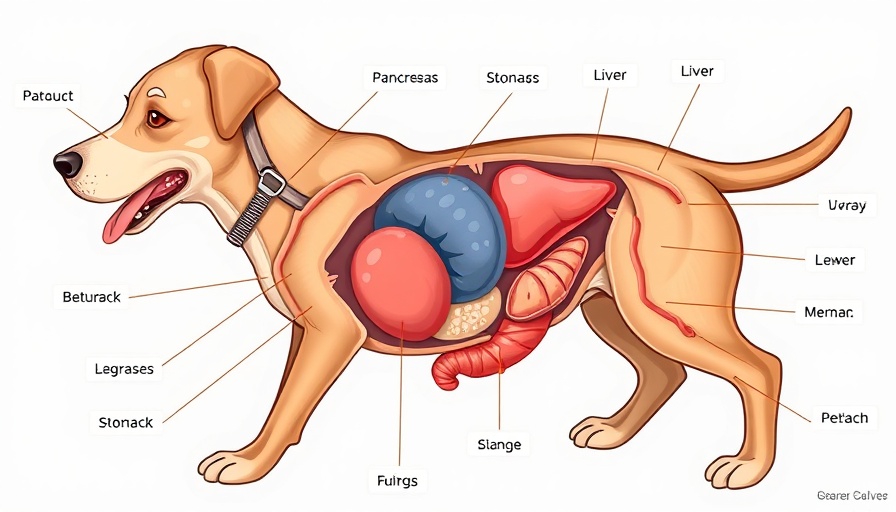
Understanding Canine Pancreatitis: A Crucial Overview
Canine pancreatitis is a potentially fatal condition that inflames the pancreas, an organ critical for digestion and blood sugar regulation. In dogs, when the pancreas becomes inflamed, digestive enzymes can escape into the abdominal cavity, leading to serious complications like tissue damage and organ failure if not promptly addressed. Commonly, veterinarians categorize pancreatitis into two types: acute pancreatitis, which presents suddenly, and chronic pancreatitis, a long-term inflammation that manifests gradually. It’s essential for dog owners to comprehend this ailment, as early detection can make a significant difference in recovery outcomes.
What Triggers Pancreatitis in Dogs?
While the exact triggers of pancreatitis remain unclear in many cases, several known factors greatly increase risk. High-fat diets—often due to indulgent treats, table scraps, or sudden dietary changes—are the foremost culprits. Conditions such as obesity, which predisposes pets to more severe health issues, trauma to the abdomen, and several underlying illnesses, further heighten the risk of developing this affliction. Additionally, certain dog breeds, notably Miniature Schnauzers and Yorkshire Terriers, are genetically disposed to pancreatitis.
Identifying Symptoms: The Key to Prompt Diagnosis
Effective management depends heavily on recognizing the symptoms associated with pancreatitis. Owners should be vigilant for signs including:
- Vomiting: Frequent or severe vomiting may be the first noticeable symptom.
- Abdominal Pain: Dogs may show signs of distress, such as a hunched back or reluctance to be touched around their midsection.
- Loss of Appetite: Affected dogs may refuse food or water.
- Lethargy: Unusual tiredness or weakness is a common indicator.
- Diarrhea: This may involve greasy or bloody stools.
- Fever: An elevated body temperature may signify inflammation.
- Dehydration: Signs include dry gums and excessive panting.
If your pet shows any combination of these symptoms, immediate veterinary assistance is crucial.
Diagnostic Procedures: How Vets Confirm Pancreatitis
Diagnosing pancreatitis can be challenging due to the non-specific nature of the symptoms. Typically, veterinarians will conduct a thorough physical examination, including blood tests to identify elevated levels of pancreatic enzymes like amylase and lipase. Imaging techniques such as ultrasounds are employed to visualize the pancreas and help confirm or rule out the disease. The cPLI (canine pancreatic lipase immunoreactivity) test is particularly reliable for detecting pancreatitis in canines.
Effective Treatment Options for Pancreatitis
Treatment protocols chiefly focus on supportive care. Common approaches involve:
- Providing intravenous (IV) fluid therapy to combat dehydration and electrolyte imbalance.
- Administering pain relief and antiemetic medications to address discomfort and nausea.
- Implementing a low-fat diet during recovery to help the healing process.
- In severe cases, hospitalization may be necessary for comprehensive monitoring and care.
Long-term management often includes establishing strict dietary protocols, emphasizing low-fat dog food, and setting portions to maintain an ideal weight.
Prevention is Key: Keeping Your Pet Safe
Preventing pancreatitis entails regular monitoring of your dog's diet and overall health. Feeding your pet a balanced, high-quality diet while strictly avoiding table scraps is crucial. Maintaining a healthy weight through exercise and portion control is essential. Additionally, staying informed regarding any medications your dog is taking and discussing their potential side effects with your vet can further mitigate risk.
Amplifying Awareness: Why This Matters
Each dog owner has the vital role of advocating for their pet's health. By understanding the signs, risks, and preventive measures associated with pancreatitis, pet parents can ensure timely intervention and avoid potentially grave outcomes. Engaging with your vet for regular health check-ups and being attentive to any behavioral changes in your dog can drastically enhance their quality of life.
Conclusion: Proactive Steps for Pet Owners
In summary, pancreatitis poses significant health risks to dogs but can be effectively managed with awareness and prompt veterinary care. Always prioritize keeping your dog on a balanced diet, regularly monitor their health, and maintain open lines of communication with your veterinarian. By taking proactive measures, you not only protect your pup from this serious condition but also promote a happier, healthier life for your beloved pet.
 Add Row
Add Row  Add
Add 




 Add Row
Add Row  Add
Add 

Write A Comment